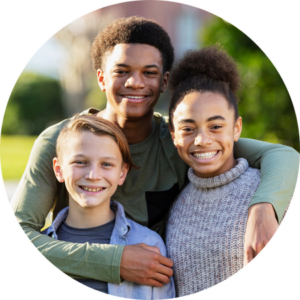Open Your Heart and Home
 Becoming a foster parent offers a profound opportunity to make a tangible difference in the life of a child in your community. By opening your heart and home to a child in need, you are providing them with a committed and reliable environment during a critical time in their lives. According to a 2022 report from the Minnesota Department of Human Services, there were approximately 11,235 youth experiencing foster care in Minnesota. Due to the high volume of youth in foster care, we are seeking families to provide safe, stable, temporary homes for foster youth in Minnesota.
Becoming a foster parent offers a profound opportunity to make a tangible difference in the life of a child in your community. By opening your heart and home to a child in need, you are providing them with a committed and reliable environment during a critical time in their lives. According to a 2022 report from the Minnesota Department of Human Services, there were approximately 11,235 youth experiencing foster care in Minnesota. Due to the high volume of youth in foster care, we are seeking families to provide safe, stable, temporary homes for foster youth in Minnesota.
The need for foster parents is great all over the state, especially for those youth who have complex behavioral and mental health needs. These youth may have some involvement with juvenile corrections and are in need of safe and reliable homes who can understand their history and behaviors as a language of trauma and experiences.
To meet this need, we have partnered with Dakota County to launch a foster parent recruitment initiative to identify safe, stable, and reliable homes who can support the needs of ALL youth.
Who Makes a Great Foster Parent?
Foster parents are as diverse as the children they care for. A foster parent may be single, married, or partnered, have children or not have children, rent, or own their home. The common thread that ties all foster parents together is a genuine concern for the wellbeing of children and a commitment to help them through tough times. Foster families provide critical temporary care and nurturing environments to children in crisis.
Successful foster parents are those who truly desire to walk alongside a family and build positive, respectful relationships. They create safety and trust, and they instill hope. Foster parents should wholeheartedly believe in and support reunification when possible.
Helping You Every Step of the Way
We are committed to helping prospective families learn about the higher needs of youth experiencing foster care by providing free one-one-one consultations, educational classes and training videos, and more. There are many paths you can take to become a foster parent! Learn more about how you can take your first step below.
This initiative is made possible through a grant between Children’s Home Society of Minnesota and Dakota County Social Services that seeks to respond to the need to provide homes for youth experiencing foster care.
Choose Your Own Path: Take the First Step Towards Becoming a Foster Parent
Educational Training Videos:
View our free library of training videos presented by child welfare and mental health professionals. You will gain valuable information about the challenges youth in foster care face and how you can become a consistent and reliable caregiver.







